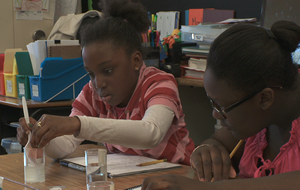Five great reasons to learn science through inquiry

1. Inquiry is the central strategy that scientists use in their learning. As students carry out their own inquiries, they engage in scientific practices and develop scientific habits of mind. These scientific practices and ways of thinking can be used throughout their lifetime.
2. To support the development of these skills and perspectives, student learning is set in the context of a science investigation. Through these firsthand investigations, students develop ownership of their science learning. As they carry out investigations, they collect, represent, analyze, and interpret observational and measurement data. Through facilitated discussion with peers, they construct models and explanations and learn to value other perspectives and to defend and debate their ideas.
3. Students learn to value evidence. They learn that evidence lies in the data they collect. They use evidence to support their ideas and explanations, and to make claims that answer investigation questions. They depend on evidence to defend an idea or take a stand.
4. Students learn to communicate their ideas and findings through writing, drawings, and graphical representations in their science notebooks, and orally during small group work and class discussions.
5. Students build their own meaning or understanding as they learn through inquiry, engaging in scientific practices. In the process, they gain insight into the nature of the scientific enterprise.



